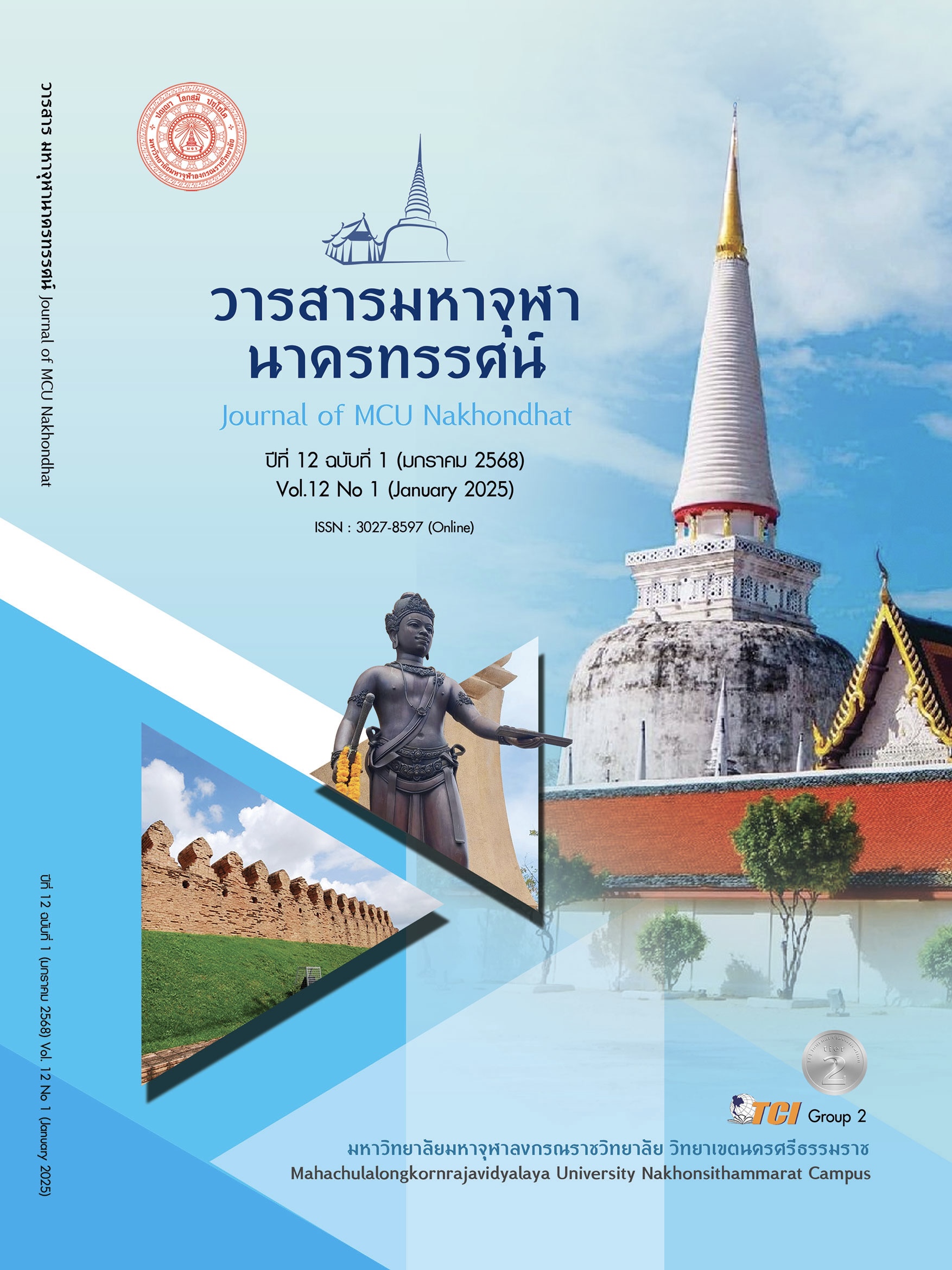A STUDY OF MANAGERIAL COMPETENCY COMPONENTS FOR YOUNG HOSPITALITY ENTREPRENEURS IN THE WORLD HERITAGE CITY OF LUANG PRABANG, LAO PDR
Main Article Content
Abstract
The objectives of this research were 1) To study managerial competency components for young hospitality entrepreneurs in Luang Prabang World Heritage City, 2) To synthesize essential managerial competency components for young hospitality entrepreneurs in Luang Prabang World Heritage City, and 3) To analyze managerial competency components for young hospitality entrepreneurs in Luang Prabang World Heritage City, Lao People's Democratic Republic. This documentary research consisted of two phases: 1) Synthesizing components from relevant documents and research including academic journals, theses, research reports, books, and related documents, and 2) Validating components by five experts comprising hospitality business management specialists, representatives from entrepreneur associations, and researchers. The research instrument was a 5-point rating scale questionnaire that passed content validity verification. Data were analyzed using mean and standard deviation with a frequency criterion of 60 percent or higher. The findings revealed five competency components, ranked by appropriateness mean scores: 1) Government collaboration ( = 5.00) in regulatory compliance and access to business support, 2) Leadership (
= 4.85) including vision, change management, and digital technology, 3) Financial management (
= 4.80) covering planning, fundraising, and risk management, 4) Hospitality entrepreneurship (
= 4.70) comprising marketing development, product and service development, and 5) Human resource management (
= 4.67) including workforce planning, recruitment, performance evaluation, compensation management, and effective organizational culture building. These identified components can be applied to develop training courses, establish policies, and create sustainable cooperation in hospitality business development.
Article Details

This work is licensed under a Creative Commons Attribution-NonCommercial-NoDerivatives 4.0 International License.
References
กรมส่งเสริมการส่งออก กระทรวงพาณิชย์. (2554). คู่มือ การค้าและการลงทุน สาธารณรัฐประชาธิปไตยประชาชนลาว. เรียกใช้เมื่อ 15 กันยายน 2567 จาก https://www.dft.go.th/Portals/3/Users/001/01/1/LaosTradeandInvestmentHandbook.pdf
ณัฏฐพัชร มณีโรจน์. (2560). กำรจัดกำรกำรท่องเที่ยวโดยชุมชน. วารสารท่องเที่ยวไทยนานาชาติ, 13(2), 25-46.
เทพดวงจันทร์ บุญธิเดช. (2567). การพัฒนาศักยภาพของบุคลากรธุรกิจการท่องเที่ยวในเมืองหลวงพระบาง สาธารณรัฐประชาธิปไตยประชาชนลาว. วารสารสังคมศาสตร์และศาสตร์รวมสมัย, 5(2), 38-51.
ธนาภรณ์ตราชู และฉลองศรีพิมลสมพงศ์. (2564). การพัฒนาความสามารถในการปรับตัวของธุรกิจนําเที่ยวไทยเพื่อตอบสนองอุปสงค์การท่องเที่ยวในยุคดิจิทัล. วารสารเทคโนโลยีภาคใต้, 14(1), 14-23.
ปิยะนุช เงินคล้าย. (2561). การศึกษาเปรียบเทียบนโยบายและรูปแบบการท่องเที่ยวเชิงสร้างสรรค์ระหว่างประเทศไทยและสาธารณรัฐประชาธิปไตยประชาชนลาว. วารสารเกษมบัณฑิต, 19(พิเศษ), 161-174.
พูลำพอน สีหาวง. (2563). กลยุทธ์การดำเนินงานเพื่อความมีประสิทธิผลของคณะชาวหนุ่มประชาชนปฏิวัติลาว แขวงสะหวันนะเขต สาธารณรัฐประชาธิปไตยประชาชนลาว. ใน วิทยานิพนธ์ครุศาสตรดุษฎีบัณฑิต สาขาวิชาการบริหารการศึกษาและภาวะผู้นำ. มหาวิทยาลัยราชภัฏสกลนคร.
ศรัณยา เลิศพุทธรักษ์ และคณะ. (2556). คุณภาพการบริการของธุรกิจโรงแรมใน สปป.ลาว เพื่อรองรับนักท่องเที่ยวจากประชาคมเศรษฐกิจอาเซียนกรณีศึกษา นครหลวงเวียงจันทน์. วิทยาลัยพาณิชยศาสตร์, 8(1), 58-63.
ศูนย์วิจัยกสิกรไทย. (2562). ตลาดค้าปลีก สปป.ลาว โอกาสทำเงิน SME ไทย. เรียกใช้เมื่อ 15 กันยายน 2567 จาก https://www.kasikornresearch.com/th/analysis/k-social-media/Pages/SME-Lao-18-10-19.aspx
อินทะวงศ์์ คตพังนา และศริพันธุ์ จุรีมาศ. (2565). รููปแบบกลยุทธ์การบรูหารความรับผิดชอบต่อสังคมขององค์กรธุรกิจในสาธารณรัฐประชาธิปไตยประชาชนลาว (สปป.ลาว). วารสารสถาบันวิจัยพิมลธรรม, 9(3), 45-59.
Traveloka. (2024). 25 ที่เที่ยวหลวงพระบาง สัมผัสดินแดนมรดกโลก และเมนูอาหารสุดแซ่บที่ไม่ควรพลาด. เรียกใช้เมื่อ 15 กันยายน 2567 จาก https://www.traveloka.com/th-th/explore/activities/25-places-to-travel-luang-prabang/51702


